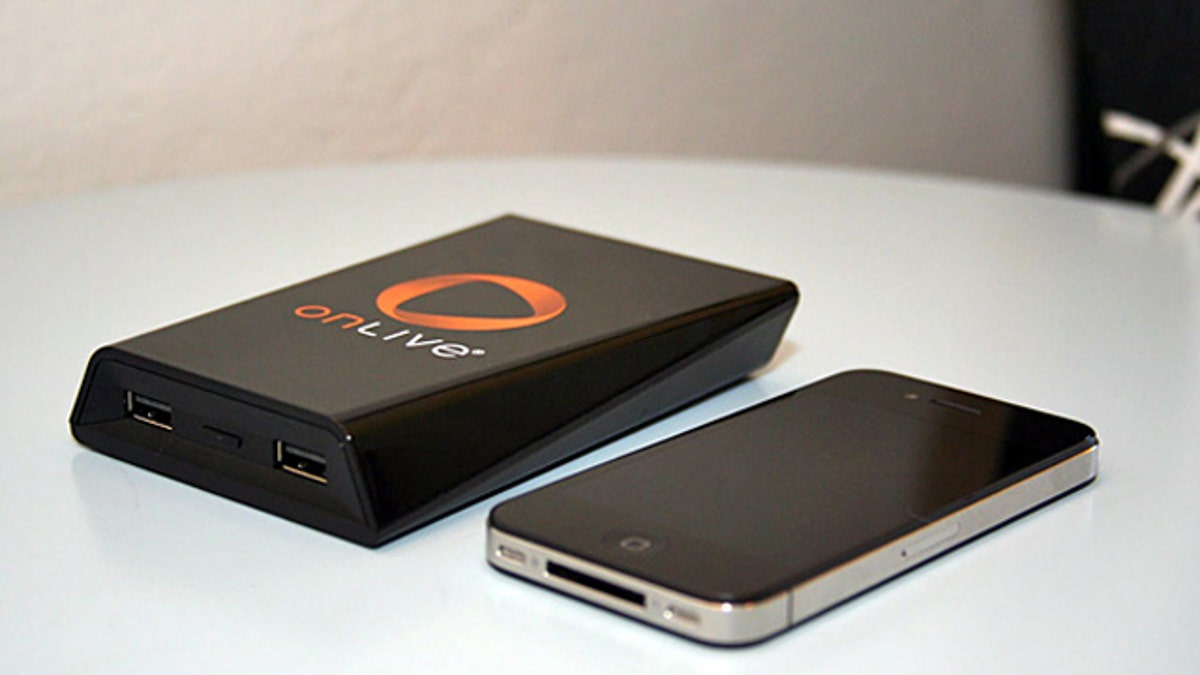
The OnLive online gaming system -- and other cloud-based ways to access video games -- threaten to transform the billion dollar video game market and end the era of the dedicated game console. (OnLive)
The end is near -- for game consoles, anyway.
While dedicated machines like Nintendo Wii and Xbox 360 currently rule the gaming world, they may be the last of their kind. Evolving consumer demand, falling prices, and smartphones that play a whole lot more than Brickbreaker threaten to completely change how consumers play games at home and on the go.
“I actually think consoles are a thing of the past,” avid gamer Mark Ormond told FoxNews.com. He confessed to playing more games on his iPhone these days than on his Wii or Xbox 360.
“Why pay $50-60 for sequels of the same games on $300 machines when I can play newer experiences elsewhere in a lot less time -- and for a lot less money -- on devices I already use more?” he asked.
Ormond obviously doesn’t speak for every gamer. Fanatics who play more than 10 hours a week -- sometimes as much as 5-6 hours per day -- are more than happy to regularly part with that kind of cash for admittedly deeper and longer-lasting gameplay.
But as non-traditional gaming platforms expand, can Nintendo, Sony and Microsoft keep doing business as usual? Do consoles even have a place in the future?
Not in the traditional sense, says outspoken gaming analyst Michael Pachter. “Gaming will move to the cloud,” he told FoxNews.com this week. And that’s a body blow for console makers, who make money on not only their own games, but hardware sales and licensing fees.
To further complicate the issue, consumers are already warming to the idea of not owning their games, production consultant Keith Fuller told FoxNews.com. “Every time someone uses Gmail, Netflix Instant, or Amazon’s Cloud Player, they’re already buying into the concept of using a service without physically owning or installing something.”
Translation: As long as they get to play their favorites, gamers won’t care how they access their games, so “established consoles will have to rethink how they operate,” Fuller adds.
To be fair, Nintendo has yet to detail their next console, so it could end up being something radically different. But if the recent release of Nintendo’s 3DS handheld and rumors that its next console will still favor packaged games over digital ones are any indication, Nintendo might still try to supply something consumers are no longer willing to pay a premium for.
For their part, Microsoft and Sony may be biding their time until the dust settles. In February, THQ president Brian Farrell said follow-ups to Xbox 360 and PlayStation 3 aren’t arriving any time soon, because “it’s harder to understand how to play the console cycle.”
If that’s the case, perhaps they’ll roll out Xbox or PlayStation “on demand” services, capable of being played across variety of devices -- not just from a box sitting underneath the TV.
Sony certainly seems open to the possibility. “The definition of console gaming is quickly becoming more a discussion about content and experiences than form factor,” admits John Koller, director of hardware marketing for PlayStation.
Ormond says he’d be surprised to see either Sony or Microsoft release another traditional “game box,” the kind that just plays store-bought discs in the living room.
“I actually think new Microsoft and Sony consoles won't be what we think of today," he told FoxNews.com. "They suspect they’ll be streamed to PC, mobile, and TV. If that doesn't happen right away, I expect these next consoles to be the last made by any of these companies.”
Without ruling out that possibility, video game consultant Scott Steinberg says such a radical shift would take time. “Given their established brands, considerable fan bases and exclusive games, video game consoles will enjoy popularity for the foreseeable future,” he predicts.
Whatever happens, it’s obvious services like iOS (rumored to be coming to Apple TV), Steam Games, and Onlive have commoditized video games, reducing the need for any specialized hardware.
“A few great titles and a few intriguing incentives is all it will take for gaming as a service to gain momentum,” concludes Fuller. “Imagine if you saw a TV advertisement for the next Grand Theft Auto or Call of Duty on something unexpected? It could happen within a few years.”
Still, Nintendo remains optimistic for the future of its soon to be released box, noting that consoles will always have a home -- so long as they’re played with friends and family on kumbaya-sized TVs.
“Consoles display games on the biggest screen in the house,” said Marc Franklin, director of public relations for Nintendo. “No other game device can match their impact. No other type of gaming brings people together in the same way.”
Blake Snow is a freelance journalist who used to play a lot more games before starting a family. He can be reached via his website.








































